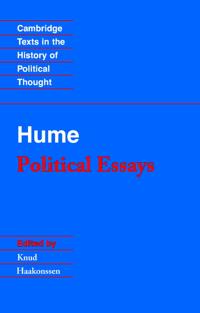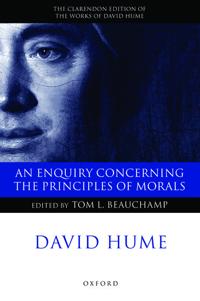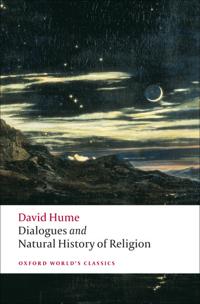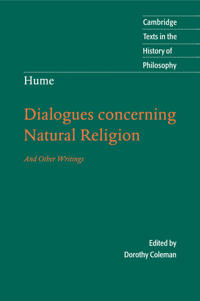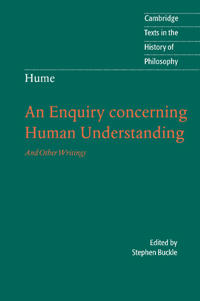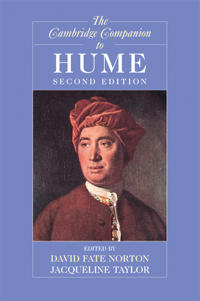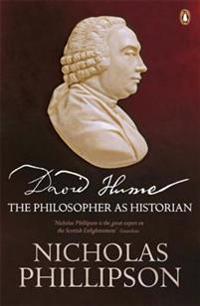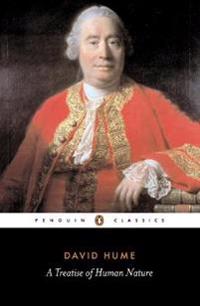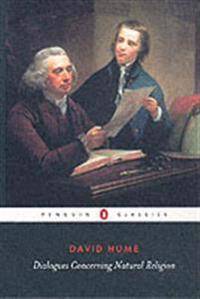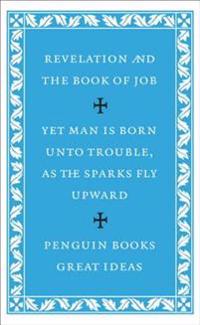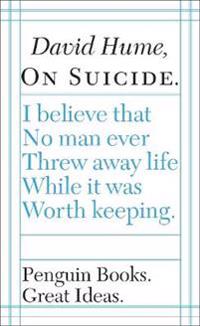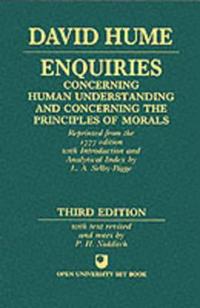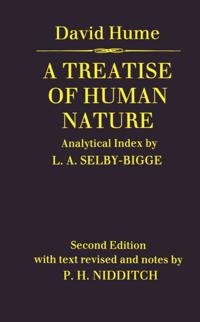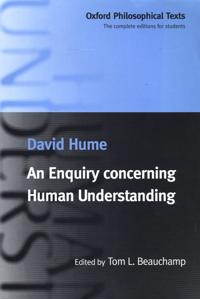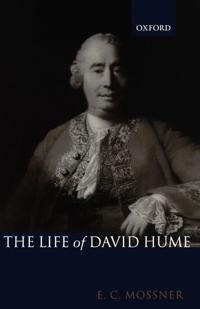David Hume Kennerly on the iPhone (Pocket)
avDavid Hume (PHT) Kennerly, Ed (INT) O'Neill, David Hume (PHT) Kennerly
ISBN: 9781939621139 - UTGIVEN: 2014-10Includes a fold-out mosaic that shows 365 photos, one a day from the year, and approximately 150 larger pictures all taken in 2013 with the iPhone. David Hume Kennerly: On the iPhone is Pulitzer prize-winning photographer David Hume Kennerly's philosophical journey through his photographic career, [...]
Hume: Political Essays (Häftad)
avDavid Hume
ISBN: 9780521466394 - UTGIVEN: 1994-07David Hume is commonly known as one of the greatest philosophers to write in English. He was also one of the foremost political and economic theorists and one of the finest historians of the eighteenth century. His political essays reflect the entire range of his intellectual engagement with politic[...]
An Enquiry Concerning the Principles of Morals (Pocket)
avDavid Hume, Tom L. (EDT) Beauchamp, David Hume
ISBN: 9780199266333 - UTGIVEN: 2006-06About Hume David Hume (1711-1776) is one of the greatest of philosophers. Today he probably ranks highest of all British philosophers in terms of influence and philosophical standing. His philosophical work ranges across morals, the mind, metaphysics, epistemology, and aesthetics; he had broad int[...]
Dialogues and Natural History of Religion (Pocket)
avDavid Hume, J. C. A. Gaskin, David Hume
ISBN: 9780199538324 - UTGIVEN: 200904David Hume is the greatest and also one of the most provocative philosophers to have written in the English language. No philosopher is more important for his careful, critical, and deeply perceptive examination of the grounds for belief in divine powers and for his sceptical accounts of the causes [...]
Dialogues Concerning Natural Religion, And Other Writings (Pocket)
avDavid Hume, Dorothy (EDT) Coleman, David Hume
ISBN: 9780521603591 - UTGIVEN: 2007-04David Hume's Dialogues concerning Natural Religion, first published in 1779, is one of the most influential works in the philosophy of religion and the most artful instance of philosophical dialogue since the dialogues of Plato. It presents a fictional conversation between a sceptic, an orthodox Chr[...]
An Enquiry Concerning Human Understanding. And Other Writings (Pocket)
avDavid Hume, Stephen (EDT) Buckle, David Hume
ISBN: 9780521604031 - UTGIVEN: 2007-03David Hume's An Enquiry Concerning Human Understanding, first published in 1748, is a concise statement of Hume's central philosophical positions. It develops an account of human mental functioning which emphasizes the limits of human knowledge and the extent of our reliance on (non-rational) mental[...]
The Cambridge Companion to Hume (Pocket)
avDavid Fate Norton, Jacqueline Taylor, David Fate Norton
ISBN: 9780521677349 - UTGIVEN: 200812Although best known for his contributions to the theory of knowledge, metaphysics, and philosophy of religion, Hume also influenced developments in the philosophy of mind, psychology, ethics, political and economic theory, political and social history, and aesthetic theory. The fifteen essays in thi[...]
David Hume (Storpocket)
avNicholas Phillipson
ISBN: 9780140287295 - UTGIVEN: 201105A giant of the eighteenth-century Enlightenment, David Hume was one of the most important philosophers ever to write in English. He was also a brilliant historian. In this succinct study, Nicholas Phillipson shows how Hume freed history from religion and politics. As a philosopher, Hume sought a way[...]
A Treatise of Human Nature (Storpocket)
avDavid Hume
ISBN: 9780140432442 - UTGIVEN: 198510One of the most significant works of Western philosophy, Hume's Treatise was published in 1739-40, before he was thirty years old. A pinnacle of English empiricism, it is a comprehensive attempt to apply scientific methods of observation to a study of human nature, and a vigorous attack upon the pri[...]
Dialogues Concerning Natural Religion (Storpocket)
avDavid Hume
ISBN: 9780140445367 - UTGIVEN: 199002In the posthumously published "Dialogues Concerning Natural Religion", the Enlightenment philosopher David Hume attacked many of the traditional arguments for the existence of God, expressing the belief that religion is founded on ignorance and irrational fears. Though calm and courteous in tone - a[...]
The Revelation of St John the Divine and the Book of Job (Pocket)
avVoltaire, Albert Camus, David Hume
ISBN: 9780141023854 - UTGIVEN: 200508Throughout history, some books have changed the world. They have transformed the way we see ourselves - and each other. They have inspired debate, dissent, war and revolution. They have enlightened, outraged, provoked and comforted. They have enriched lives - and destroyed them. Now Penguin brings y[...]
On Suicide (Pocket)
avDavid Hume
ISBN: 9780141023953 - UTGIVEN: 200508Throughout history, some books have changed the world. They have transformed the way we see ourselves and each other. They have inspired debate, dissent, war and revolution. They have enlightened, outraged, provoked and comforted. They have enriched lives and destroyed them. Now Penguin brings you[...]
Enquiry Concerning the Principles of Morals, An: A Critical Edition (Inbunden)
avDavid Hume
ISBN: 9780198235002 - UTGIVEN: 1998-07-16Enquiries Concerning Human Understanding and Concerning the Principles of Morals (Pocket)
avDavid Hume, L. A. Selby-bigge, P. H. Nidditch
ISBN: 9780198245360 - UTGIVEN: 197506The philosophical writings are presented together with an essay discussing their composition and notes explaining allusions, ambiguous phrases, and technical terms[...]
A Treatise of Human Nature (Häftad)
avDavid Hume, L.A. Selby-Bigge
ISBN: 9780198245889 - UTGIVEN: 197811Reprinted from the original edition in three volumes and edited, with an analytical index, by L. A. Selby-Bigge. Revised by P. H. Nidditch.[...]
Enquiry Concerning Human Understanding, An (Inbunden)
avDavid Hume
ISBN: 9780198250609 - UTGIVEN: 2000-10-26Hume's System: An Examination of the First Book of His Treatise (Pocket)
avDavid F. Pears
ISBN: 9780198750994 - UTGIVEN: 1991-01-03Hume's System: An Examination of the First Book of His Treatise (Inbunden)
avDavid F. Pears
ISBN: 9780198751007 - UTGIVEN: 1991-01-03A Treatise of Human Nature (Pocket)
avDavid Hume
ISBN: 9780198751724 - UTGIVEN: 2000-01-01"A Treatise of Human Nature" (1739-40), David Hume's comprehensive attempt to base philosophy on a new, observationally grounded study of human nature, is one of the most important texts in Western philosophy. This volume offers the Treatise, Hume's abstract, annotation and explanation.[...]
An Enquiry Concerning The Principles Of Morals (Häftad)
avDavid Hume
ISBN: 9780198751847 - UTGIVEN: 1998-01The Oxford Philosophical Texts series consists of authoritative teaching editions of canonical texts in the history of philosophy from the ancient world down to modern times. Each volume provides a clear, well laid out text together with a comprehensive introduction by a leading specialist, giving t[...]
An Enquiry Concerning Human Understanding (Häftad)
avDavid Hume
ISBN: 9780198752486 - UTGIVEN: 199903Oxford Philosophical Texts Series Editor: John Cottingham The Oxford Philosophical Texts series consists of authoritative teaching editions of canonical texts in the history of philosophy from the ancient world down to modern times. Each volume provides a clear, well laid out text together with a co[...]
David Hume: Moral and Political Theorist (Inbunden)
avRussell Hardin
ISBN: 9780199232567 - UTGIVEN: 2007-08-30The Life of David Hume (Pocket)
avErnest Campbell Mossner
ISBN: 9780199243365 - UTGIVEN: 2001-05Mossner's Life of David Hume remains the standard biography of this great thinker and writer. First published in 1954, and updated in 1980, it is now reissued in paperback, in response to increased interest in Hume. E. C. Mossner was Emeritus Professor of English at the University of Texas at Austin[...]
David Hume (Häftad)
ISBN: 9780199266340 - UTGIVEN: 2006-04about Hume: David Hume (1711-1776) is one of the greatest of philosophers. Today he probably ranks highest of all British philosophers in terms of influence and philosophical standing. His philosophical work ranges across morals, the mind, metaphysics, epistemology, and aesthetics; he had broad in[...]
Selected Essays (Pocket)
avDavid Hume
ISBN: 9780199540303 - UTGIVEN: 2008-08-01In his writings, David Hume set out to bridge the gap between the learned world of the academy and the marketplace of polite society. This collection, drawing largely on his Essays Mortal, Political, and Literary (1776 edition), comprehensively shows how far he succeeded.
As seen in these select[...]


